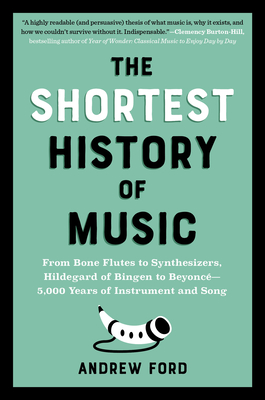The Shortest History of Music: From Bone Flutes to Synthesizers, Hildegard of Bingen to Beyoncé - 5,000 Years of Instrument and Song

The Shortest History of Music: From Bone Flutes to Synthesizers, Hildegard of Bingen to Beyoncé - 5,000 Years of Instrument and Song
No art form is as widely discussed--or as readily available--as music. With the click of just a few buttons, modern humans can decide what they think of the brand-new Beyoncé just as quickly as they can form opinions on Brahms or the Beatles or Bob Dylan. But things weren't always this way. In this brisk, breakneck history, award-winning musician and broadcaster Andrew Ford dives into the constant evolutions and reinventions that have led to the popularity and accessibility of modern music--from early oral songs, to the invention of a notation, to the first recording technology and record companies--all paving the way for the multibillion-dollar industry we know today. In fewer than 300 pages, Ford explores:
- Why playing history's earliest example of notated music--clay tablets from 1400 BCE Syria--doesn't produce a consistent sound
- How colonization and the slave trade led to one region in West Africa having an unparalleled influence on world music
- How clerical and royal support allowed early composers to invent the symphony
- Why the BBC hired a bird impersonator to sound like a nightingale in an early live broadcast of cello music
- What leads humans to make music in the first place--and why music plays such a massive role in our culture.
With photographs, illustrations, and notational diagrams throughout, The Shortest History of Music takes us on a lively, authoritative tour through several thousands of years of music history, tracing our relationship with this essential art and allowing us to freshly appreciate and understand music today.
PRP: 68.40 Lei
Acesta este Prețul Recomandat de Producător. Prețul de vânzare al produsului este afișat mai jos.
61.56Lei
61.56Lei
68.40 LeiLivrare in 2-4 saptamani
Descrierea produsului
No art form is as widely discussed--or as readily available--as music. With the click of just a few buttons, modern humans can decide what they think of the brand-new Beyoncé just as quickly as they can form opinions on Brahms or the Beatles or Bob Dylan. But things weren't always this way. In this brisk, breakneck history, award-winning musician and broadcaster Andrew Ford dives into the constant evolutions and reinventions that have led to the popularity and accessibility of modern music--from early oral songs, to the invention of a notation, to the first recording technology and record companies--all paving the way for the multibillion-dollar industry we know today. In fewer than 300 pages, Ford explores:
- Why playing history's earliest example of notated music--clay tablets from 1400 BCE Syria--doesn't produce a consistent sound
- How colonization and the slave trade led to one region in West Africa having an unparalleled influence on world music
- How clerical and royal support allowed early composers to invent the symphony
- Why the BBC hired a bird impersonator to sound like a nightingale in an early live broadcast of cello music
- What leads humans to make music in the first place--and why music plays such a massive role in our culture.
With photographs, illustrations, and notational diagrams throughout, The Shortest History of Music takes us on a lively, authoritative tour through several thousands of years of music history, tracing our relationship with this essential art and allowing us to freshly appreciate and understand music today.
Detaliile produsului










